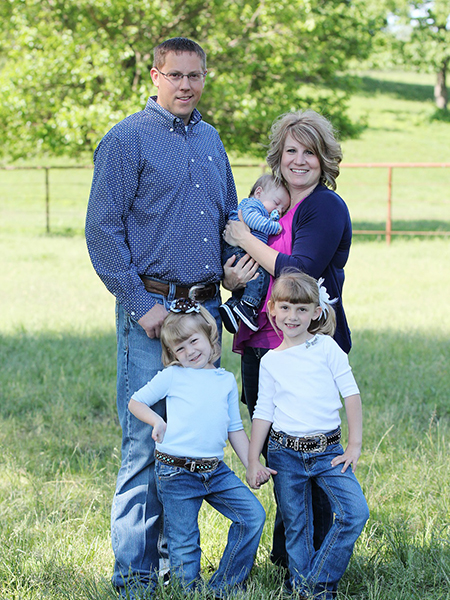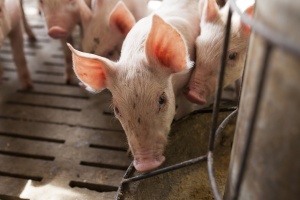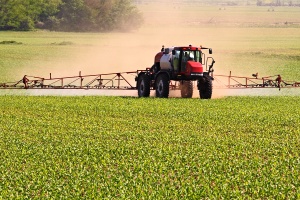Raising Families, Food and Awareness
A voice from a local Illinois farm speaks up about farm animal care issues that matter to consumers.
One thing I know for sure is that every mom feels the way I do about what she provides for her children. We all want to be sure we’re giving them the best this world has to offer and that we’re passing on the best of everything we’ve learned. For us, that includes keeping our kids involved in the day-to-day running of our farm, from the time a calf is born to the day it’s shipped off to be raised before going to market.
We truly believe the more we teach our kids and the more questions they ask, the better understanding they’re going to have in years to come. It’s the same with everyone; we all deserve answers to our questions. And, with only about two percent of Americans actively involved in farming, it’s natural that people will have a lot of questions about what farmers and ranchers do to put food on everyone’s table. I’m happy to offer the best answers I can based on what I’ve learned from my life in agriculture.

You raise animals for food. Do you care about their living conditions?
People who live off the farm may wonder whether farmers and ranchers care about the welfare of the animals they raise. The short answer is yes. The longer answer? First you have to understand how our farm works. We run what’s called a cow-calf farm. We have a herd of about 100 mother cows, and hopefully they each have one calf a year. We raise those calves until they are ready to be weaned from their mother’s milk and eat a more grain-based diet for added nutrition, just like human babies are transitioned from milk to baby food.
The thing is, it turns out doing what makes cows happy and comfortable also makes good business sense. That’s because, just like humans, beef cattle thrive and grow best when they’re not experiencing stress or anxiety or discomfort. So ensuring our animals have healthy, comfortable conditions is satisfying in two ways. As people who grew up around livestock, we care about the welfare and comfort of the animals we’re responsible for. And that in turn helps us to be successful, and to continue raising healthy, happy calves. If our animals don’t thrive, then neither can we.

How do you know when you’re giving your animals the proper care?
Michael and I have been around farm animals all our lives, so a lot of what we need to know is second nature to us. But that doesn’t mean we don’t keep learning. A lot of people don’t realize how many farmers today have college degrees, with expertise in areas from animal science to crop and environmental technology. When we hear about new research into animal behavioral science, we’re serious about finding out how we can apply it to our own herd. More and more, we’re finding out about how important it is to allow cows and calves the opportunity to perform natural and instinctive behaviors essential to their health and well-being. So we make provisions to ensure social interaction, comfort, and physical and psychological well-being.
There are many factors that contribute to animal well-being, including food, water, bone and muscle strength, immunity to illness, as well as overall behavior and health. Farmers participate in a continuing education and certification program specially focused on animal husbandry techniques called Beef Quality Assurance. This program has empowered farmers to continuously improve the safety and wholesomeness of beef and provide the best animal care. It is a comprehensive set of sound production practices, which includes the following:
- Provide adequate food, water and care to protect cattle health and well-being.
- Provide disease prevention practices to protect herd health.
- Provide facilities that allow safe and humane movement and/or restraint of livestock.
- Provide personnel with training to properly handle and care for cattle.
That part about providing the proper training goes right to the heart of the question. Just like anyone who reads the papers or watches the news, we’ve heard about cases of animal abuse within the livestock industry. And, I think it’s important to note that these seem to occur in operations where the people working with the animals may be untrained, or under-trained, in the best ways to care for farm animals. Personally, because we run a family business, I believe that when you have a connection with the success of a farm, like we do with ours, you’re just not going to see that kind of animal abuse. As I mentioned earlier, caring about animal welfare is the morally right thing to do and just makes good business sense.

What does humane treatment mean to you?
I understand why consumers want to know that farmers and ranchers practice good animal care. To me, that means that when people go to the grocery store or to a restaurant, they can feel like the treatment of the animals was ethical and humane. From my perspective, we wouldn’t have it any other way.
The way most cow-calf operations work, the animals spend a lot of their time outside, grazing on pastureland. We supplement that with a really nutrient-packed supplemental feed. We watch them all closely and work with our veterinarian to control infectious diseases and metabolic disorders along with regular herd health checkups and overall guidance on animal care. Really, that’s a combination of science and common sense. Humane treatment to me means understanding the animals as best we can and providing an environment that lets them thrive.
You know, farming is one of the toughest jobs in the world. I think it’s also one of the most rewarding. Everybody’s life is full of ups and downs, and raising cattle is no different. We take great pride in what we do every day, and ideally we can pass this all down to our kids.
By being raised on a farm and with livestock, we hope our children can take away as many skills and values as we’ve built throughout the years. We want them to have a good work ethic and be responsible for the choices they make.
Agriculture has always been a huge part of our lives, and I feel we’re extremely blessed to be raising our children with the same values and traditions we enjoyed in our own childhood.











0 Comments